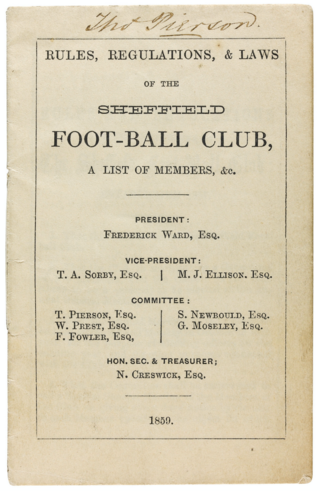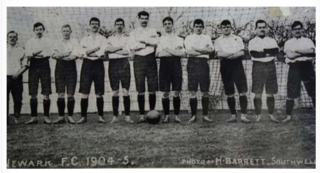| Full name | Hulme Athenaeum Football Club | |
|---|---|---|
| Founded | 1863 | |
| Dissolved | 1873? | |
| Ground | Hullard Hall, Trafford | |
| Hon. Secretary | John Nall, Charles Barton | |
Hulme Athenaeum F.C. was an English association football club from Manchester.
| Full name | Hulme Athenaeum Football Club | |
|---|---|---|
| Founded | 1863 | |
| Dissolved | 1873? | |
| Ground | Hullard Hall, Trafford | |
| Hon. Secretary | John Nall, Charles Barton | |
Hulme Athenaeum F.C. was an English association football club from Manchester.
The club was based at the Hulme Athenaeum, a clubhouse founded in 1860 by William Thackeray Marriott in order to improve the health of the working classes in the district. Members of the institution started the football club in November 1863 and bookkeeper John Nall became the club secretary, a post he held until 1870, by which time the club had 45 members. [1] Within two years of its founding, the club was attracting members from Sale and Bowdon. [2]
Unusually, the club did not charge members a joining fee, and had a 1 shilling nominal annual membership fee, which could be reduced in certain circumstances. [3] The club was the first association football club in Manchester, and sometimes played under Sheffield rules. [4] The club was associated with other sporting activities, and an early club captain, James Warrington, claimed tohave joined "for the sake of the gymnasium". [5] Warrington was a gas rental collector, demonstrating that the club membership was working-class, whereas other clubs were based on public school backgrounds; in Manchester, ex-public school pupils played rugby football. [6]
The club played every Saturday for its first five seasons, mostly games within the membership because of the lack of external opposition. [7] The first match against external opposition was a 2–0 win over Longsight in November 1865, played in Belle Vue, and with 15 per side. [8] Its last recorded game was to Sheffield rules, against regular opponents Garrick in January 1872. [9]
The club folded in around 1873–4, perhaps because of a lack of external opposition; other than Sale, which only briefly played association football, and which the club only played twice (in 1866 and 1867), the only other association club in Lancashire by then was Turton F.C., founded in 1871. Many members joined Manchester Association F.C. on the latter's establishment in 1875. [10]
The club played in white, with blue trimmings. [11]
The club originally played at Hullard Hall, a quarter of a mile from Old Trafford railway station. [12] Its final ground was on Moss Side. [13]
Wanderers Football Club was an English association football club. It was founded as "Forest Football Club" in 1859 in Leytonstone. In 1864, it changed its name to "Wanderers", a reference to it never having a home stadium, instead playing at various locations in London and the surrounding area. Comprising mainly former pupils of the leading English public schools, Wanderers was one of the dominant teams in the early years of organised football and won the inaugural Football Association Challenge Cup in 1872. The club won the competition five times in total, including three in succession from 1876 to 1878, a feat which has been repeated only once.

The Sheffield Rules was a code of football devised and played in the English city of Sheffield between 1858 and 1877. The rules were initially created and revised by Sheffield Football Club, with responsibility for the laws passing to the Sheffield Football Association upon that body's creation in 1867. The rules spread beyond the city boundaries to other clubs and associations in the north and midlands of England, making them one of the most popular forms of football during the 1860s and 1870s.

Charles William Alcock was an English sportsman, administrator, author and editor. He was a major instigator in the development of both international football and cricket, as well as being the creator of the FA Cup.

The Cromwell Cup was the second ever Sheffield rules football competition and was held in Sheffield, England. It was held in February 1868 and named after Oliver Cromwell, manager of the local Alexandra Theatre, who donated the cup. He also played for the Garrick club. The tournament was only open to teams under two years old. The final was held at Bramall Lane, Sheffield. The trophy is still held in the Sheffield Wednesday trophy cabinet.
Heeley F.C. was an English association football club based in Sheffield, Yorkshire.

N.N. Club or N.N. Kilburn—N.N. standing for "No Names" —was an amateur English football club based in the Kilburn district of London.
Hertfordshire Rangers F.C. was a 19th-century English amateur football team based in Watford, Hertfordshire. It competed in the FA Cup and had two players represent England in international matches.
Shropshire Wanderers F.C. was an amateur association football club based in Shrewsbury, England. The club was active during the 1870s and once reached the FA Cup semi-finals.
The West Kent Football Club was a 19th-century association football and rugby football club that was notable for being one of the twenty-one founding members of the Rugby Football Union, as well as producing a number of international players in the sport's early international fixtures.
Garrick Football Club was an English association football club based in Sheffield, Yorkshire.
Pilgrims F.C. was an English association football club based in Clapton, London. During their history they played at various grounds in Tottenham and Walthamstow, but for the most part played home games at Hackney Downs.
Gitanos Football Club was an English association football club and one of the first members of the Football Association.
Clapham Common Club, usually known by its initials C.C.C., was a mid-nineteenth century amateur English football club based at Clapham Common.

The Football Annual was a reference work published annually from 1868 to 1908. It reported on the various codes of football played in England, and also provided some coverage of the other home nations, supplemented on occasion by reports from around the world. While association and rugby football provided its main focus, it also included some material on public school football, Sheffield football, and, on occasion, even Australian and American football. A typical issue would include laws of the various codes, a summary of the preceding season, a listing of football clubs in England, and essays about aspects of the game.
Norfolk Football Club was an English football club based in the Norfolk Park suburb of Sheffield.
Manchester Association F.C. was an English association football club from Eccles, founded in 1875 in order to revive the association game in Manchester.

Newark F.C. was a football club from the town of Newark-on-Trent, Nottinghamshire. It was one of the first clubs to play association football.
Shrewsbury F.C. was a football club based in Shrewsbury, England. The club is recorded as playing its home games at Monkmoor Lane, Shrewsbury.

John Campbell Orr was an association football player and administrator, who was the most important figure of the promotion of the game in Birmingham in the 1870s.